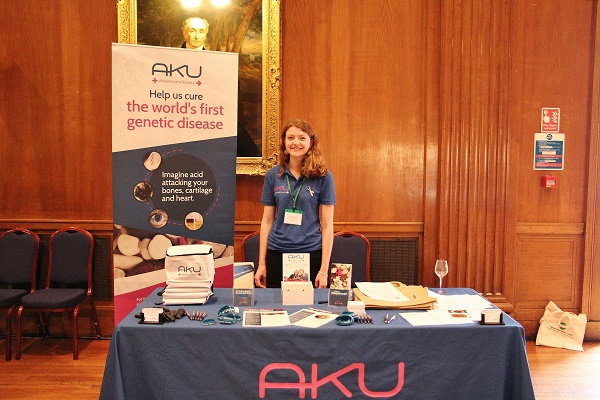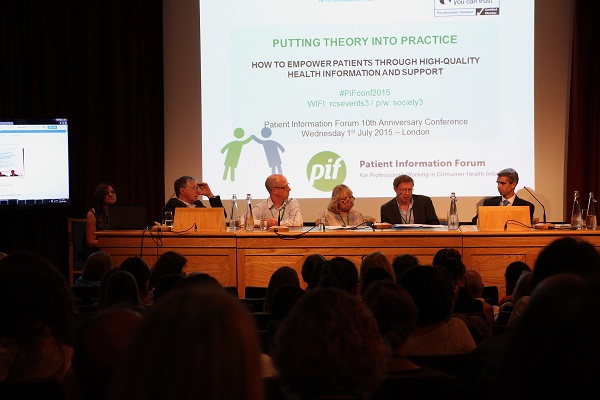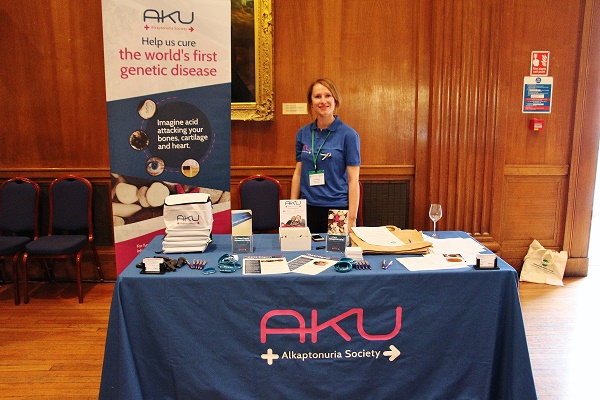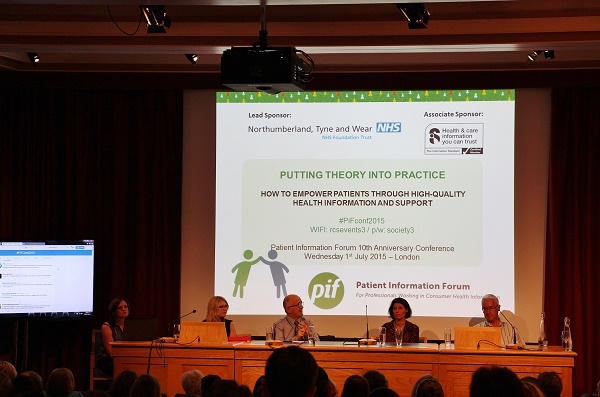On the 1st July we made our way to the Royal College of Surgeons in London for the Patient Information Forum’s (PiF) Annual Conference. This year the focus was around turning rhetoric in to reality by empowering patients through information and support. It was also the first year we have had a stall in the exhibition hall. In today’s blog we reveal how the day went, and why we enjoyed exhibiting.
Why PiF?
At the AKU Society we believe good quality information is absolutely crucial. It is our aim to support patients, and to do this effectively we need to work closely with them, understand their needs, and produce information to help them improve their quality of life.
This is why we have recently become a member of PiF, a not for profit membership organisation working to support and facilitate the production of good quality health information. We have been to several of their conferences before, and this year we decided to exhibit a stall to raise awareness of what we do.

As we arrived to set up our stall in the exhibition hall, it was already clear it was going to be a scorching day. In fact, it turned out to be the hottest July day on record! Despite the heat, the day was incredibly productive- especially after we were all given ice creams in the break to cool us down!
An Interactive Approach
PiF believe in finding new and effective ways to present information to patients, so this year they decided to carry this practice in to their conference too! The day got rid of all presentations and powerpoints, instead encouraging discussion, questions and interaction.
After an initial welcome, the first session was a panel discussion on empowering patients through engagement and involvement. The panel were from a variety of organisations, including NICE, Mindand Patient Opinion.
The discussion emphasised the need to involve patients more, with David Haslam asking ‘Whose Illness is it anyway?’ He said patient involvement should be a key part of a doctor’s education.

There was also a mention of growing online resources empowering patients, and the importance of peer support in online communities. However, this is only helpful to patients who are online. Communication needs to take on multiple formats, and libraries could play a strong role in making all types of information accessible to everyone.
This panel session was followed by a speed networking session, encouraging everyone to meet several new people. The conference continued after a break with another panel discussion on championing health information and valuing the professionals who work in the sector. The need to help patients identify good, reliable information was discussed, as well as the challenge of changing how healthcare and information is delivered to patients.
The afternoon brought more interaction, with different shared learning zones around the building focusing on varied topics. It was very helpful to be able to drop in to the zones relevant to us as a charity. We joined some informative discussions on health literacy, reaching your audience, and measuring the impact of information. These are all things we are currently working to improve.
Raising Awareness
Before the event, we were able to have leaflets put in to every delegate bag, giving information on AKU. Throughout the day we had many people coming up to our stall saying they had never heard of it until they looked at the leaflet, and wanting more information.

As well as educating people about AKU, we were able to tell people what projects we are currently working on. It was very important to us to share one of our most recent and most exciting information projects- our online RCGP learning module. This is currently featured on the PiF online toolkit as an example of good information production.
Attending the event, and joining us on our stall throughout the day, was expert AKU dietician, Shirley Judd. Shirley works with patients attending the National Alkaptonuria Centre to help them balance their diet when on nitisinone. It was fantastic to partner with Shirley at this event, as we are currently working with her, and a selection of patient volunteers, to develop an AKU recipe book. This patient involvement ensures only the best recipes will make it to the final book.
As well as meeting many other delegates, we also found meeting the other exhibitors very helpful. We are soon applying to be part of the Information Standard, so it was great to meet their team and discuss how we go about doing this. This is a great organisation which works with groups to ensure the health information they produce is accurate, helpful, and up to the best standard.

We also had lots of fun meeting Monkey from Monkey Wellbeing. Monkey is a great little character, who features in lots of books for children explaining various health visits, so they know just what to expect when they go to the hospital for a procedure, or to visit a relative. We are currently working on a guest blog for Monkey Wellbeing explaining the early symptoms of AKU!

